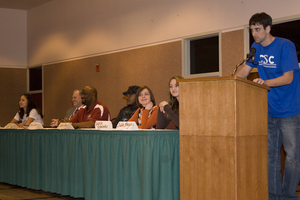Forum at CSC explores diversity issues

Members of a panel at Chadron State College last week encouraged an audience made up largely of middle school students to keep an open mind while pursuing new acquaintances and cultural experiences.
The panel, which consisted of four college students and two college employees from various cultural backgrounds, spoke during the second annual Diversity Forum in the Student Center. The forum was sponsored by CSC’s Students in Free Enterprise team and organized by senior member Felipe Cecilio of Sao Paulo, Brazil.
The event was attended by the entire Chadron Middle School, which consists of more than 225 students in grades 5 through 8. After the forum, they spent the afternoon participating in free enterprise activities led by SIFE members.
The panel members consisted of junior Christy Webber of Manderson, S.D., Jovan Mays of Aurora, Colo., Julia Bayer of Stutgart, Germany, Iuliia Kovalenko of the Ukraine, CSC student services counselor Carl Cousin and Dr. Gary White, dean of Business, Economics, Applied and Mathematical Sciences.
Panel members read a number of their favorite quotations from notable figures from history. Mays quoted Martin Luther King about the dangers of “sincere ignorance and conscious stupidity.”
“Being diverse is not just being a friend of someone who is of a different race or embracing people because of those differences,” Mays said after reading the quote. “It’s also the same as learning. Every time you read a book, every time you go to class, every time you learn something new, you are constantly making yourself more diverse.”
Mays recited “Impossible,” a poem he wrote about conquering issues of race. The middle schoolers expressed amazement after Mays completed the piece, which was more than three minutes and 20 seconds long.
Cousin, the other black member of the panel, told about how his service in the military helped him become more diverse. After growing up in Axton, Va., he was stationed in Fairbanks, Alaska, for 3½ years after enlisting in 1988.
Cousin said he “cried a little bit” when receiving his orders, but said his time in Alaska ended up being one of the greatest experiences of his life.
“By going there, I met a lot of folks who I never would have met by staying home and working at the same old tired factory that everyone else was working at,” he said.
As an example of how people can broaden their horizons by leaving the “beaten path,” Cousin told about a conversation with a fellow serviceman who would become, and remains, one of his best friends.
“He said, ‘Carl, I just want to tell you, you’re the first black person that I ever liked.’ He told me that in the small town he lived in, there was one black person and that person caused trouble. So, from that one individual, he stereotyped an entire race.”
Cousin, who coordinates the college’s study abroad efforts and assists international students, said he tries to make a point of becoming more diverse each day.
White, who is white, also related his cultural experiences to the group.
“When I grew up on a small farm in northeast Iowa, I didn’t know anything about diversity,” he said. “In other words, when I was your age, I don’t think I’d ever seen anyone of color.”
White said that he has since lost count of the number of countries to which he’s traveled and the number of international students with whom he’s worked.
“As I have progressed through my professional career, I’ve begun to understand that diversity is a strength. Understanding and getting to know people of a diverse background makes you a better person.”
He encouraged the students to not be judgemental about the differences of people from other cultures, but to explore the dissimilarities and learn from them.
Webber, a 2005 graduate of Pine Ridge High School, told the students that they don’t need to travel to another country to become more diverse. She said the United States, including the American Indian reservation just north of Chadron, offers many opportunities for people to explore other cultures.
Most of the questions from the middle school students were directed to the three international students -- Bayer, Kovalenko and Cecilio -- who shared similarities and differences with their countries and the challenges of leaving their homeland. Each gave examples of their language, and fielded inquiries about their countries’ foods and sports.
Cecilio said one of his first challenges in his first semester as a college student in the United States was a speech class.
“I play basketball, and I don’t remember sweating so much playing basketball as I did in that speech class,” he said.
Category: Campus News
